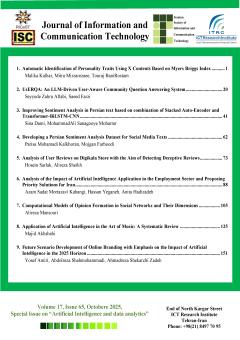Analysis of the Impact of Artificial Intelligence Application in the Employment Sector and Proposing Priority Solutions for Iran
Subject Areas : تخصصی
Azam Sadat Mortazavi
1
,
Hassan Yeganeh
2
*
![]() ,
Anita Hadizadeh
3
,
Anita Hadizadeh
3
![]()
1 - ICT Research Institute
2 -
3 - ICT Research Institute
Keywords: Application of artificial intelligence, employment, solution, upstream documents, prioritization,
Abstract :
The rapid growth of transformative technologies has created numerous opportunities and challenges for economic sectors. The impact of artificial intelligence (AI) on the economy and labor market, along with future projections, has drawn the attention of policymakers and decision-makers to this field. Studies and forecasts evaluate these impacts differently depending on the level of development of various countries. Therefore, preparing for the effects of AI application in the labor market, considering its role in the national economy, requires thorough examination. This study proposes and prioritizes strategies to address AI-related challenges in employment in Iran. Through a qualitative approach, the study identifies higher-level policy documents using a document-based methodology and analyzes their content to derive relevant considerations. By mapping these considerations to recommendations from international organizations, initial strategies were developed and finalized through the Delphi method, involving 14 experts in the field. These strategies were then prioritized using the AHP method and Super Decision software. The findings reveal that the strategy "focusing policymakers' and regulators' efforts on drafting and updating regulations for relevant sectors and establishing suitable enforcement mechanisms" ranks highest in the education and skills dimension. The strategy "investing in strengthening the technological and digital skills of the current and future workforce by updating skill indicators in recruitment and workforce evaluation processes" is prioritized in the workforce employment dimension, while the strategy "policy-making to promote digital literacy mechanisms and enhance public digital culture" is paramount in the digital literacy dimension
[1]https://www.gartner.com/en/newsroom/press-releases/2023-10-11-gartner-says-more-than-80-percent-of-enterprises-will-have-used-generative-ai-apis-or-deployed-generative-ai-enabled-applications-by-2026.
[2]https://www.gartner.com/en/newsroom/press-releases/2017-12-13-gartner-says-by-2020-artificial-intelligence-will-create-more-jobs-than-it-eliminates.
[3] Iftekhairul Islam, Fahad Shaon. (2020). If the Prospects of Some Occupations Are Stagnating with Technological Advancement? A Task Attribute Approach to Detect Employment Vulnerability. arXiv:2001.02783v1.
[4] Dandan Qiao, Huaxia Rui, Qian Xiong. (2024). AI and Jobs: Has the Inflection Point Arrived? Evidence from an Online Labor Platform.
[5] International Monetary Fund, (2024). “Gen-AI: Artificial Intelligence and the Future of Work”.
[6] Gmyrek, P., Berg, J., & Bescond, D. (۲۰۲۳). Generative AI and Jobs: A global analysis of potential effects on job quantity and quality. ILO Working Paper.
[7] باشگاه اقتصاددانان، آثار هوش مصنوعی بر بازار کار، دنیای اقتصاد، شماره 5870، آبان 1402.
[8] Braun, V. & Clarke, V. (2006). “Using thematic analysis in psychology”, Qualitative Research in Psychology, Vol. 3, No. 2, Pp. 77-101.
[9] Holloway, I. & Todres, L. (2003). “The Status of Method: Flexibility, Consistency and Coherence”, Qualitative Research, Vol. 3, No. 3, Pp. 345-357.
[10]https://www.europarl.europa.eu/at-your-service/en/stay-informed/research-and-analysis.
[11] https://www.worldbank.org/en/access-to-information/ai-committee.
[12] https://www.oecd.org/digital/artificial-intelligence/.
[13]AI is likely to significantly impact jobs. https://www.oecd-ilibrary.org/science-and-technology/oecd-artificial-intelligence-papers_dee339a8-en.
[ 4] Emilio Colombo, Fabio Mercorio, Mario Mezzanzanica, Antonio Serino. (2024). “Towards the Terminator Economy: Assessing Job Exposure to AI through LLMs”, arXiv:2407.19204v1.
[ 5] J. E. Triplett, (1999). "The Solow productivity paradox: What do computers do to productivity?" The Canadian Journal of Economics, vol. 32, no. 2, pp. 309-334.
[ 6] D. H. Autor, (2015). "Why are there still so many jobs? The history and future of workplace automation," Journal of Economic Perspectives, vol. 29, no. 3, pp. 3-30.
[ 7] EPRS, (2021). “Digital Automation and the Future of Work. Brussels,” European Union.
[ 8] E. Brynjolfsson and A. McAfee, (2014). “The Second Machine Age: Work, Progress, and Prosperity in a Time of Brilliant Technologies”, W. W. Norton & Company.
[ 9] C. B. Frey and M. A. Osborne, (2017). "The future of employment: How susceptible are jobs to computerization?" Technological Forecasting and Social Change, vol. 114, pp. 254-280.
[20] Sabina-Cristiana Necula. (2023). “Artificial Intelligence Impact on The Labour Force -- Searching for The Analytical Skills of The Future Software Engineers”, arXiv:2302.13229v1.
[21] S. P. Mohanty, U. Choppali, and E. Kougianos, (2016). "Everything you wanted to know about smart cities: The Internet of things is the backbone," IEEE Consumer Electronics Magazine, vol. 5, no. 3, pp. 60-70.
[22] World Bank, (2019). The Changing Nature of Work.
[23] D. H. Autor, F. Levy, and R. J. Murnane, (2003). "The skill content of recent technological change: An empirical exploration," The Quarterly Journal of Economics, vol. 118, no. 4, pp. 1279-1333.
[24] J. Manyika et al., (2017). "Jobs lost, jobs gained: What the future of work will mean for jobs, skills, and wages," McKinsey Global Institute.
[25] Yu Yang, (2020). “Analysis of the Impact of Artificial Intelligence Development on Employment”, IEEE.
[26] صادقی فسایی، سهیلا؛ عرفان منش، ایمان. (1394). مبانی روش شناختی پژوهش اسنادی در علوم اجتماعی مورد مطالعه: تأثیرات مدرن شدن بر خانواده ایرانی. راهبرد فرهنگ، شماره بیست و نهم، بهار.
[27] House of Commons Science, Innovation and Technology Committee, (2023). “The governance of artificial intelligence: interim report”, Ninth Report of Session 2022–23.
[28] V. Dignum, (2019). “Responsible Artificial Intelligence: How to Develop and Use AI in a Responsible Way”, Springer.
[29] ۴۰ درصد از مشاغل جهان تحت تاثیر هوش مصنوعی – ITIRAN | آی تی ایران
[30] OECD, (2021). “Artificial Intelligence and Employment: New Evidence from Occupations Most Exposed to AI”.

